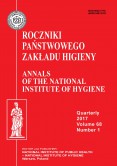Rocz Panstw Zakl Hig 2021, 72(2): 137-143
Associations between diet and acne lesions
[Associations between diet and acne lesions]
ABSTRACT
Acne is one of the most common dermatological conditions affecting millions of people worldwide. It is assumed that the main etiological factors acne are considered to be the excessive production of sebum and hormones, and the colonisation of P. acnes bacteria. The relationship between diet and acne lesions is still the subject of debate and scientific criticism.
On the one hand, studies suggest that an elimination diet is of no benefit in the treatment of acne, while other studies indicate that there is a close a close relationship between diet and the occurrence of acne lesions. Already in the 1970s, some scientists claimed that the course of acne could be modified by specific dietary components. Several studies have confirmed, among others, the role of a diet with a high glycemic index diet in acne exacerbation and suggested that a low glycemic index diet for several weeks may lead to a reduction in the number of acne lesions. The effect of milk consumption was also investigated in terms for its potential role in acne pathogenesis, including its ability to increase insulin levels. In the last decade, studies have also emerged to determine the effect of dark chocolate on the exacerbation of acne symptoms. To date, it has not been conclusively established which component of chocolate may have a potentially adverse effects on the course of acne. The article summaries the current knowledge on the relationship between diet and acne lesions, and discusses the results of recent studies on selected dietary components that may exacerbate acne.
STRESZCZENIE
Trądzik jest jednym z najczęstszych schorzeń dermatologicznych dotykających miliony ludzi na całym świecie. Przyjmuje się, że głównymi czynnikami etiologicznym trądziku jest nadmierna produkcja łoju i hormonów oraz kolonizacja bakterii Propionibacterium acnes (P. acnes). Związek pomiędzy dietą a zmianami trądzikowymi nadal stanowi przedmiot dyskusji i krytyki naukowej. Z jednej strony wyniki badań sugerują, że dieta eliminacyjna nie przynosi korzyści w leczeniu trądziku, inne badania wskazują, na istnienie ścisłego związku między dietą a występowaniem zmian trądzikowych.
Już w latach 70. naukowcy twierdzili, że przebieg trądziku może być modyfikowany przez określone składniki diety.
Wyniki kilku badań potwierdziły między innymi rolę diety o wysokim indeksie glikemicznym w zaostrzeniu trądziku i sugerowały, że stosowanie przez kilka tygodni diety o niskim indeksie glikemicznym może prowadzić do zmniejszenia liczby zmian trądzikowych. Zbadano także wpływ spożycia mleka pod kątem jego potencjalnej roli w patogenezie trądziku, w tym zdolności do zwiększania poziomu insuliny. W ostatnim dziesięcioleciu pojawiły się również badania mające na celu określenie wpływu ciemnej czekolady na zaostrzenie objawów trądzików. Dotychczas nie ustalono jednoznacznie, który ze składników czekolady może mieć potencjalnie niekorzystny wpływ na przebieg trądziku.
W artykule podsumowano dotychczasową wiedzę na temat zależności pomiędzy dietą i zmianami trądzikowymi oraz omówiono wyniki najnowszych badań dotyczących wybranych składników diety, które mogą wpływać na nasilenie trądziku.
Liczba pobrań: 11071


